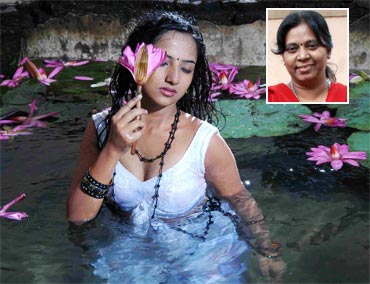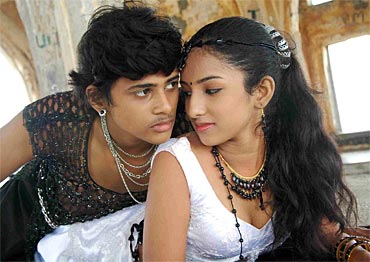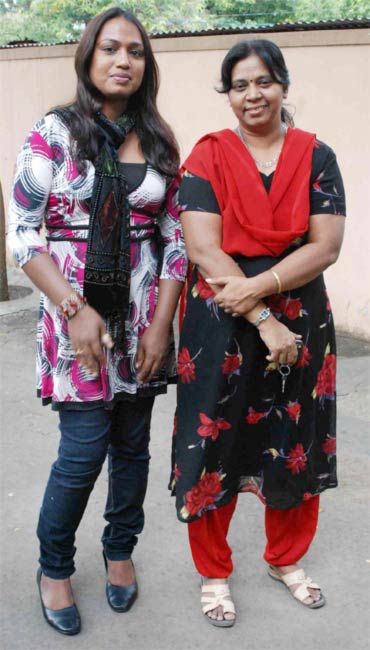 | « Back to article | Print this article |
Narthaki: A touching film on transgenders
It needs immense conviction and courage to make a film on a subject that's considered a taboo in India, and debutante filmmaker Vijayapadma has achieved that rare feat. Her first Tamil film Narthaki, ready for release this Friday, is the emotional journey of a transgender.
In this interview, Vijayapadma talks to Shobha Warrier about Narthaki that will be dubbed in Russian and German soon, and will also be remade in Telugu, Kannada and Hindi.
Why did you decide to make a film on transgenders?
It all started with my work with the AIDS Control Society. I used to write a lot about the awareness programmes on the disease. During that period, I met many transgenders and learnt that their early life is very traumatic. So I decided to make a documentary on them.
In the meanwhile, I also made a documentary on child sexual abuse. Later I thought instead of a documentary on transgenders, I should make a feature film on them as only that can reach more people.
Nobody came forward to make a film on the subject and so I thought of approaching NFDC, which did not materialise. That was when I met Geetha who came onboard as the producer. She was looking for an offbeat story.'The early life of a transgender is very important'
Was Geetha impressed with the story?
Yes, she was. I consider it a miracle. We decided to make it a commercial film based on an offbeat story.
The first person I approached was G V Prakash, for music. He was so attracted to the story that he offered to take a cut in his renumeration and came up with some wonderful compositions for the film.
The movie's title is Narthaki. Is it about a dancer?
As it's a commercial film, I chose dancing as the career of the transgender. The story starts in a village called Vilar near Thanjavur. Subbu, the son of a silambu master, grows up there.
Instead of following martial arts like his father, he is attracted to dance in which his mother was an expert but she never pursued it after her marriage. While he wakes up to the joys of dancing, he also realises that he is a girl within.
The early life of a transgender is very crucial. The film follows Subbu as he enters adulthood from adoloscence. As his self-awareness grows, he runs away to Mumbai.
'Narthaki shows transgenders' experiences realistically'
Transgenders in Mumbai go through a traumatic life. Have you shown that in your film?
Yes, I have shown all that they face quite realistically. We've portrayed every little detail and all the ways of the community. I have shown even the traditional sex change operation they undergo.
Won't that be shocking?
It will be shocking. It may shock us but they celebrate it like marriage. It is a very emotional and important moment for a transgender. I captured the emotions and not the gore connected with castration.
Did you shoot the Mumbai parts in the real locations?
Yes. The other transgenders were very helpful. Nearly 100 of them have participated in my film. They were all very friendly and nice people to work with.
'Narthaki will be remade in Telugu, Kannada and Hindi'
How did you choose Kalki, a transgender, for the main role?
I wanted to make people aware of the community and what they go through. So I wanted someone from the community who is well known. I chose Kalki because she has done a lot for the community and is a very well known figure. She has started the Sahodari Foundation and a few other foundations. She is a mass communications student and a responsible person. Because it was a Tamil film, I wanted a south Indian face, too.
It was reported that even before the release, you got offers to remake Narthaki in other languages. Is it true?
It is true. It will be remade in Telugu, Kannada and Hindi. I will direct all the remakes. We cannot dub Narthaki as nativity is very important in this story. So each film will be in a way different.
Narthaki will also be dubbed into Russian and German.
I will also be sending the film to many film festivals. People are looking for good and different movies and I am sure all of them will love Narthaki.



